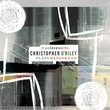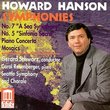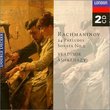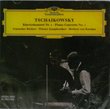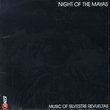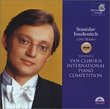| All Artists: Nikolai Roslavets, Tatyana Lazareva Title: Roslavets: Complete music for cello & piano Members Wishing: 0 Total Copies: 0 Label: Chandos Release Date: 2/27/2001 Genre: Classical Styles: Chamber Music, Forms & Genres, Sonatas, Historical Periods, Classical (c.1770-1830), Modern, 20th, & 21st Century, Instruments, Strings Number of Discs: 1 SwapaCD Credits: 1 UPC: 095115988121 |
Search - Nikolai Roslavets, Tatyana Lazareva :: Roslavets: Complete music for cello & piano
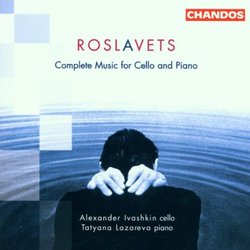 | Nikolai Roslavets, Tatyana Lazareva Roslavets: Complete music for cello & piano Genre: Classical
|
Larger Image |
CD DetailsSimilarly Requested CDs |
CD ReviewsTurbulent, Morbid, and Profound Cello Music from the "Russia Hexameron | 11/13/2008 (5 out of 5 stars) "Nikolai Roslavets (1881-1944) belongs to an unusual group of Soviet composers active in the 1920s and 1930s that were, during the reign of Stalin, victims of ruthless oppression. In a time when music served as propaganda for the Soviet state, there was no tolerance for the "formalist" compositions of experimental and avant-garde composers like Roslavets. However, even though Roslavets's name was purged from the history books and public consciousness, he was greatly esteemed in his heyday, especially by Shostakovich, Stravinsky, and Myaskovsky. Recent scholarship has also shown that he was the first Russian composer to write an atonal work and that he conceived a system of tone organization in 1915 long before Schoenberg introduced serialism, hence Roslavets' "Russian Schoenberg" appellation today.
Although my only exposure to these works has been through this recording, I am aware that the First Cello Sonata and the "Meditation" have been recorded elsewhere (Cello Alchemy-Music from Russia | Roslavetz: Sonate (1921); Méditation). Regardless, the performances by Alexander Ivashkin (cello) and Tatyana Lazareva (piano) are technically robust and emotionally involved. Their conveyance of the somber and harrowing "Meditation" is a case in point. This sounds like something Scriabin would have written had he lived a few years longer and had an interest in chamber music. While there are extended moments of melancholy respites, the work is more virtuosic and intense than its title suggests; both the cello and piano part are more active and less reflective. The "Dance of the White Girls" is an interesting impressionistic piece composed in 1913. Besides the opening dance-like melody, Roslavets focuses more on lyrical rhetoric and occasional forays into darker moods. Roslavets's two cello sonatas are masterpieces and exceed even the quality of his violin sonatas. The First Cello Sonata dates from 1921 and is a compact 9-minute single-movement piece of heavy chromaticism and expert motivic transformation. The thematic material is far more melodic than is typically found in Roslavets's compositions. There is never a dull moment with the constant eruptions of powerful and expressive climaxes and cadences. The Second Cello Sonata written a year later in 1922 is more esoteric than its predecessor and is cast in a larger scale. A mood of languor, pessimism, and agitation persists throughout this hulking 20-minute masterwork. Roslavets may draw upon late Scriabin, but he clearly developed his own idiom of a rich harmonic palette, rhythmic complexity, and virtuosic writing. For an inexplicable reason, Roslavets's "Five Preludes" for solo piano are also showcased on this recording. Perhaps no other corpus from Roslavets's output is performed or recorded more often than these preludes from 1922. With powerhouse renditions by the likes of Hamelin, Lin, and Schleiermacher, there is simply no reason to buy this Chandos release for the Five Preludes. Nevertheless, Lazareva does an exceptionally fine job in her executions. She certainly possesses a commanding technique to deliver them properly, but does not measure up to Hamelin's perfection or Schleiermacher's interpretative faculties. Bottom line: Roslavets was at his best in the chamber genre and his "Meditation" and two cello sonatas are some of his finest compositions. The "Five Preludes" are also towering achievements, but in the context of this cello and piano recording, merely an added bonus. For those wishing to explore Roslavets further, I must shamelessly promote Marc-Andre Hamelin's solo piano recording (Roslavets Piano Music) and a recent Naxos release of Violin Sonatas (Nikolai Roslavets: Violin Sonatas)." |

 Track Listings (9) - Disc #1
Track Listings (9) - Disc #1

